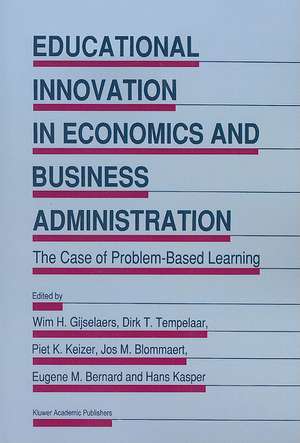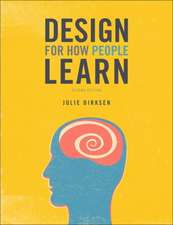Educational Innovation in Economics and Business Administration:: The Case of Problem-Based Learning: Educational Innovation in Economics and Business, cartea 1
Editat de Wim H. Gijselaers, Dirk T. Tempelaar, Piet K. Keizer, Jos M. Blommaert, Eugene M. Bernard, Hans Kasperen Limba Engleză Paperback – 9 dec 2010
The book brings together many examples of reform in economics and business education. Special attention is paid to the problem-based learning approach, which over the past ten years, has developed as a very important innovation in higher education.
The book contains contributions from a variety of institutions on the necessity of curriculum reform, the choice of instructional methods, assessment and testing, and management of change.
It is of interest for teachers in higher education, educational psychologists, and any person interested in educational innovation in economics and business administration.
| Toate formatele și edițiile | Preț | Express |
|---|---|---|
| Paperback (1) | 1226.73 lei 6-8 săpt. | |
| SPRINGER NETHERLANDS – 9 dec 2010 | 1226.73 lei 6-8 săpt. | |
| Hardback (1) | 1232.57 lei 6-8 săpt. | |
| SPRINGER NETHERLANDS – 31 ian 1995 | 1232.57 lei 6-8 săpt. |
Preț: 1226.73 lei
Preț vechi: 1496.01 lei
-18% Nou
Puncte Express: 1840
Preț estimativ în valută:
234.77€ • 244.19$ • 193.81£
234.77€ • 244.19$ • 193.81£
Carte tipărită la comandă
Livrare economică 15-29 aprilie
Preluare comenzi: 021 569.72.76
Specificații
ISBN-13: 9789048145041
ISBN-10: 904814504X
Pagini: 496
Ilustrații: X, 486 p.
Dimensiuni: 160 x 240 x 26 mm
Greutate: 0.7 kg
Ediția:Softcover reprint of hardcover 1st ed. 1995
Editura: SPRINGER NETHERLANDS
Colecția Springer
Seria Educational Innovation in Economics and Business
Locul publicării:Dordrecht, Netherlands
ISBN-10: 904814504X
Pagini: 496
Ilustrații: X, 486 p.
Dimensiuni: 160 x 240 x 26 mm
Greutate: 0.7 kg
Ediția:Softcover reprint of hardcover 1st ed. 1995
Editura: SPRINGER NETHERLANDS
Colecția Springer
Seria Educational Innovation in Economics and Business
Locul publicării:Dordrecht, Netherlands
Public țintă
ResearchCuprins
Acknowledgements.- 1. Introduction.- 2. Rhetorical Obstacles In The Teaching Of Economics.- 3. A Total Quality Improvement Approach to Student Learning.- 4. Educating Leaders For The New Competitive Environment.- 5. Perspectives On Problem-based Learning.- 6. PBL, Ideology Or Practical Solution?.- 7. Differences In The Organisation And Application Of Knowledge Between Novice, Intermediate And Experienced Auditors.- 8. Problem Solving Strategies.- 9. The Reading, Interpretation And Usage Of Scientific Articles In Undergraduate Accounting Education.- 10. The Development Of Expertise In Management Accounting.- 11. Teaching For Expertise.- 12. Choosing the Right Platform for Computer-Based Materials Used in Teaching and Learning Economics.- 13. A New Software Architecture For Simulation.- 14. Using Online Databases In Applied Economics.- 15. Running The British Economy. A High Quality Learning Environment.- 16. An Economic Game As An Interactive Learning Environment.- 17. Using A Computer Based Management Simulation Exercise For Developing Business Specific And General Transferable Skills In Hospitality Management Students.- 18. Integrating Multidimensional Business Knowledge Using A Non-Computerised Business Game.- 19. Teaching Problem-Solving And Analytical Thinking Skills With A Special Reference To Modelling In Management Science.- 20. Economics And Electronic Spreadsheets. Interdisciplinary Economics In Education.- 21. Bridging The Gap Between Informatics And Business Disciplines.- 22. Modelling And Learning. Using Systems Methodology And Algorithms In Teaching Strategic Management And Planning.- 23. Quantitative Methods In A Problem-Based Curriculum.- 24. Problem-Based Learning And Teaching Mathematical Subject An Attempt At Bridging The Gap In Maastricht.- 25. Discovery Of The Reality. Experiences With Integrated Project Studies.- 26. Teaching PIMS Principles In A Problem-based Learning Environment.- 27. Educational Innovation In Problem — Based Learning: Teaching Service Management Through Team Teaching And With Quality Techniques.- 28. Student Directed Learning. A Business Challenge For Freshmen.- 29. Problem-Based Learning In The Business Curriculum. An Alternative To Traditional Approaches.- 30. Students’ Assessment Of The Effectiveness Of The Various Activities In A Non-Traditional Course.- 31. The Use Of Students As Consultants In Live Case Study Tasks. Progress At Newcastle Business School.- 32. Looking For Benchmarks In Vocational Training.- 33. Distance Education And Problem-Based Learning.- 34. Case-Methodology To Teach Problem-Solving Skills.- 35. Variations To Problem-Based Learning Due To Course Requirements.- 36. The Development Of A Curriculum For Project Management And Real Estate Management.- 37. Peer Group Support In Economics. Innovations In Problem-Based Learning.- 38. Student Assessment In A Problem-Based Curriculum.- 39. Problem-Solving And Assessment. The Maastricht Experiences.- 40. What Do We Learn From Test Scores? A Case Study On The Use Of Test Scores For Evaluative Purposes.- 41. Discrepancies In The Labour Market For RL-Educated Economists.- 42. Do Staff Members Appreciate The Problem Based Learning Approach?.- 43. Restructuring The Maastricht Program In Economics And Business Administration. Some Lessons Learned From Managing This Project.- 44. Reflections On Innovation Methodology.- 45. Developing And Managing Faculty-Driven Innovation. A Continuous Improvement Model With Self-Directed Work Teams.- 46. Business Schools And Innovation. Receptive Contexts For Change?.- 47. Universal Learning. AScience And Methodology For Education And Training.- 48. Universal Learning As A Tool For Educational Tranformation And Process Control Systems In Problem-Based Programs.- 49. The Nature Of Education And The Short-Termism Threat The Special Case Of Accounting Education.- 50. Economics and Political Correctness in a European Setting.- 51. The Resistance Of The Established Educational System To Problem-Based Learning. The Turkish Case.- 52. Applicability Of The ‘Problem-Based Learning’ Approach To An International Student Body. Some Preliminary Results From Economics.- 53. Experiencing A Tutorial Group.- 54. Mathematics, Economics, And Electronic Spreadsheets Interdisciplinary Economies In Education.- 55. Organisation of Education In A Problem-based Programme.- 56. A Symposia. MBAs Working In A Problem-based Environment.- 57. Running The British Economy.- 58. Competence in Economics. To Test Or Not To Test, That’s The Question!.- 59. How To Design A Curriculum/Block.- 60. A Symposia. Managing The Evolution Of Problem-based Learning In The MBA Programme At Ohio University.- 61. An Interactive Simulation Game Focused On The Microeconomic Fundamentals Of Macroeconomics.- 62. Task Construction In Problem Based Learning.- 63. Bridging The Gap Between Informatics And Business Disciplines.- 64. Developing Computer Based Learning Materials For Economics Using ToolBook™.- 65. A Workshop. The Role Of The Tutor In Problem-based Learning.- 66. Using On-Line Databases In Applied Economics. A Measure Of Efficiency Or Effectiveness.- 67. Choosing The Right Platform For Computer-Based Materials Used In Teaching And Learning Economics. First Session.- 68. Computer-based Problem-solving Environments Stella.- 69. Choosing The Right Platform For Computer-Based Materials Used InTeaching And Learning Economics.Second Session.




















